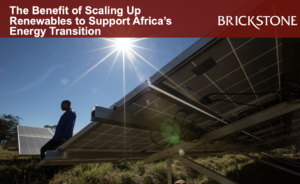North African Renewable Energy Possibilities for Europe
How North African Renewable Energy Can Benefit Europe
The energy fallout of the ongoing Russia-Ukraine war has forced European states to look for alternative sources of both conventional (nonrenewable) and renewable energy. Europe has looked to Africa to meet its demand, but the African states with the largest conventional energy reserves are plagued by instability that limits access.
As Europe moves toward a transition to green energy, it should invest in ways to help African states remove obstacles to the use of their sustainable and renewable resources. U.S. policymakers should aid these efforts with financial support, a move that will strengthen U.S. relations with African countries and help to advance its counterterrorism and great-power competition goals in the region.
Two countries that can help Europe fulfill these objectives are Morocco and Algeria. Both nations have renewable energy reserves in solar and wind power and hydropower that can be utilized to create green hydrogen, a renewable energy source that is already beginning to secure European investments. The infrastructure needed to produce and transport green hydrogen is extensive, and political obstacles include fraught Moroccan-Algerian relations and Algeria’s ties with Russia. However, investment in the sector can help to improve these relations and achieve European and U.S. economic and political goals in North Africa.
This article by Brickstone reviews New Line Institutes’ publication on North African Renewable Energy Possibilities for Europe, highlighting key facts and insights.
Challenges to Conventional Energy Projects in Africa
Although Africa is home to a significant number of nonnuclear renewable energy power systems including bioenergy, hydropower, solar PV (or solar photovoltaic panels), and wind power, this type of energy accounted for less than 10% of Africa’s total power generation as of 2021.
Most of Africa’s electricity comes from fossil fuels such as oil, natural gas, and coal. Nigeria, Algeria, and Libya play key roles in the natural gas and crude oil markets as the countries with the largest reserves and highest export levels for these fossil fuels in Africa.
Yet instability and increasing Western disinvestment limits these nations from helping Europe diversify its energy sources away from Russia. Additionally, planned construction projects for pipelines to transport gas through multiple West African countries to Europe will run into the same problem of instability, making renewable energy opportunities in other, more stable countries a wiser investment for European nations.
The European Union has already begun to recognize this trend and to shift away from fossil fuels in order to match its goal, outlined in the European Green Deal, of generating net-zero greenhouse gas emissions by 2050. Within the Green Deal, a segment that focuses on the clean energy transition addresses one key element related to Europe’s over-reliance on African conventional energy: “ensuring a secure EU energy supply.” While the EU is devoting funds from both its annual budget and its COVID-19 recovery budget to financing this Green Deal, this green transition’s speed must adjust to events on the ground in West and North Africa’s main fossil fuel-producing states.
Nigeria’s massive fossil fuel resources currently are being used in a very limited capacity. As of mid-2022, the EU annually imports 14% of its liquefied natural gas (LNG) from Nigeria. Even though the EU is interested in importing more, security breaches of the pipelines and their outdated infrastructure have led to limited output and contributed to the decrease in the amount of Nigerian LNG exported to Europe over the past couple of years.
Two major projects have been agreed on by pertinent nations to transport Nigerian natural gas to Europe despite these difficulties, but their successful construction and operation will depend on an increase of local gas production and new regional gas infrastructure that currently faces instability in the Sahel and greater West African region.
Multiple West African nations have attempted to create the infrastructure needed to better realize Nigeria’s natural gas supply, but these initiatives are constrained by regional instability; two projects in particular demonstrate this. First, Algeria, Nigeria, and Niger signed a memorandum of understanding for a trans-Saharan gas pipeline project in July 2022 that could, if successful, provide Europe potential alternatives to Russian energy.
The Trans-Saharan Gas Pipeline (TSGP) would transport gas from Nigeria to Niger to Algeria, before being transported to Italy via the undersea Transmed pipeline or being converted to LNG tankers and shipped elsewhere. The Nigerian and Algerian governments signed a Memorandum of Understanding for the project mid-2022, and the pipeline is supposed to start operating fully in 2030.
The second project is the Nigeria-Morocco gas pipeline (NMGP) that intends to transport Nigerian gas through Benin, Togo, Ghana, Ivory Coast, Liberia, Sierra Leone, Guinea, Guinea-Bissau, Gambia, Senegal, and Mauritania. The gas would then go from Morocco to Spain through the existing Maghreb-Europe gas pipeline. There are multiple issues standing in the way of the project’s success, including the cost and the lack of a timeline. Because of the large amount of physical terrain that needs to be traversed during the project’s implementation, certain aspects, such as handoffs between separate phases of the project, will be challenging to accomplish.
Read the complete blogpost here.





